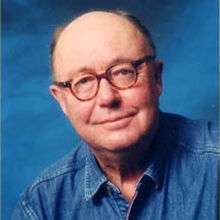Roger Needham
Roger Michael Needham, CBE, FRS, FREng (9 February 1935 – 1 March 2003)[1] was a British computer scientist.
Roger Needham | |
|---|---|
 Roger Needham in 1999 | |
| Born | 9 February 1935 Sheffield, England, UK |
| Died | 1 March 2003 (aged 68) Willingham, Cambridgeshire, England, UK |
| Nationality | British |
| Alma mater | University of Cambridge |
| Known for | Needham–Schroeder protocol BAN logic Tiny Encryption Algorithm XTEA |
| Spouse(s) | Karen Spärck Jones |
| Awards | Faraday Medal (1998) Commander of the Order of the British Empire |
| Scientific career | |
| Fields | Computer science |
| Institutions | University of Cambridge Microsoft |
| Thesis | The application of digital computers to problems of classification and grouping (1962) |
| Doctoral advisor | David Wheeler |
| Doctoral students |
|
Early life
Roger Michael Needham was born in Birmingham, England, the only child of Phyllis Mary, née Baker (c.1904–1976) and Leonard William Needham (c.1905–1973), a university chemistry lecturer.[2] He attended Doncaster Grammar School for Boys in Doncaster (then in the West Riding) going on to St John's College, Cambridge in 1953, and graduating with a BA in 1956 in mathematics and philosophy.[2] His PhD thesis was on applications of digital computers to the automatic classification and retrieval of documents. He worked on a variety of key computing projects in security, operating systems, computer architecture (capability systems) and local area networks.
Career
Among his theoretical contributions is the development of the Burrows-Abadi-Needham logic for authentication, generally known as the BAN logic. His Needham–Schroeder (co-invented with Michael Schroeder) security protocol forms the basis of the Kerberos authentication and key exchange system. He also co-designed the TEA and XTEA encryption algorithms. He pioneered the technique of protecting passwords using a one-way hash function.[3][4]
In 1962 he joined the University of Cambridge's Computer Laboratory, then called the Mathematical Laboratory, becoming Head of Laboratory in 1980. He was made a professor in 1981 and remained with the laboratory until his retirement in 1995. In 1997 he set up Microsoft's UK-based Research Laboratory. He was a founding Fellow of University College, Cambridge, which became Wolfson College.
Needham was elected to the Royal Society in 1985, became a fellow of the Royal Academy of Engineering in 1993 and received a CBE for his contributions to computing in 2001. He also was a longtime and respected member of the International Association for Cryptologic Research, the IEEE Computer Society Technical Committee on Security and Privacy and the University Grants Committee. He was made a fellow of the Association for Computing Machinery in 1994.[5]
Needham held honorary doctorate degrees from University of Twente, Loughborough University, and University of Kent.
Personal life
Needham married fellow computer scientist Karen Spärck Jones in 1958. He died of cancer in March 2003 at his home in Willingham, Cambridgeshire.[6]
Roger Needham Award
The British Computer Society, in 2004, established an annual Roger Needham Award in his honour.[7]
EuroSys Roger Needham PhD award
EuroSys[8] established the annual Roger Needham PhD award in his honour.[9] It awards €2,000 to a PhD student from a European university whose thesis is regarded to be an exceptional, innovative contribution to knowledge in the computer systems area. Past winners have been:
- 2018 Dennis Andriesse (Vrije Universiteit Amsterdam) for his PhD thesis Analyzing and Securing Binaries Through Static Disassembly
- 2015 Cristiano Giuffrida (Vrije Universiteit Amsterdam) for his PhD thesis Safe and Automatic Live Update
- 2014 Torvald Riegel (Technische Universitaet Dresden), for his thesis Software Transactional Memory Building Blocks
- 2013 Asia Slowinska (Vrije Universiteit Amsterdam) for her PhD thesis Using Information Flow Tracking to Protect Legacy Binaries
- 2012 Derek Murray (University of Cambridge), for his thesis A Distributed Execution Engine Supporting Data-Dependent Control Flow
- 2011 Jorrit Herder (Vrije Universiteit Amsterdam) for Building a Dependable Operating System: Fault Tolerance in MINIX 3
- 2010 Willem de Bruijn (Vrije Universiteit Amsterdam) for Adaptive Operating System Design for High Throughput I/O
- 2009 Jacob Gorm Hansen (DIKU) for Virtual Machine Mobility with Self-Migration
- 2008 Adam Dunkels (SICS) for Programming Memory-Constrained Networked Embedded Systems
- 2007 Nick Cook (Newcastle University) for Middleware Support for Non-repudiable Business-to-Business Interactions
- 2006 Oliver Heckmann (TU Darmstadt) for A System-oriented Approach to Efficiency and Quality of Service for Internet Service Providers
See also
- Andrew Herbert
- Maurice Wilkes (colleague)
- David Wheeler (colleague)
References
- Hoare, T.; Wilkes, M. V. (2004). "Roger Michael Needham CBE FREng. 9 February 1935 - 1 March 2003: Elected F.R.S. 1985". Biographical Memoirs of Fellows of the Royal Society. 50: 183–199. doi:10.1098/rsbm.2004.0014.
- Herbert, Andrew James, "Needham, Roger Michael (1935–2003)", Oxford Dictionary of National Biography, Oxford University Press, March 2009; online edition, January 2007. Retrieved 27 August 2018 (subscription required)
- Wilkes, M. V. Time-Sharing Computer Systems. American Elsevier, New York, (1968).
- Schofield, Jack (10 March 2003). "Roger Needham". The Guardian.
- "ACM Fellow Roger Needham Dies at 62". Pressroom. ACM. 7 March 2003.
- Peterson, Kim (6 March 2003). "Microsoft's Needham dies from cancer". The Seattle Times. Retrieved 1 October 2012.
- Roger Needham Lecture at the British Computer Society website
- "European Chapter of ACM SIGOPS". www.eurosys.org. Retrieved 7 December 2019.
- "phd-award - European Chapter of ACM SIGOPS". www.eurosys.org. Retrieved 7 December 2019.
External links
- Roger Needham at the Mathematics Genealogy Project
- Information about Roger Needham provided by his wife
- Obit: Roger Needham, The Register, 2 March 2003
- Roger Needham, Computer Security Expert, Dies at 68, The New York Times, 6 March 2003
- Speech presenting Needham with an honorary degree, Loughborough University, 13 July 2001